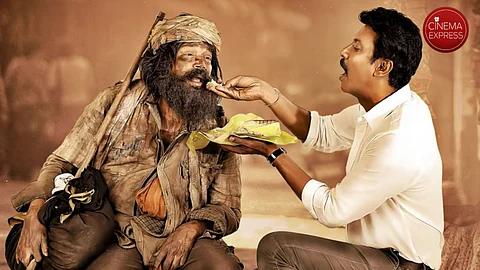Rajakili Movie Review: A hurried screenplay salvaged by good performances and message
Rajakili(2.5 / 5)
The combination of Thambi Ramaiah and Samuthirakani prepares us for everything Rajakili is expected to offer in the way it does. The film directed by Umapathy Ramaiah is high on messages and preachy in delivering them. But the catch is that that is not even the problem with the film. Even when the bar is set low, Rajakili doesn't really sweep you off your feet. But thankfully, it doesn't deflate you completely, either.
The film begins with Anandan (Samuthirakani), in charge of a care home, finding Murugappa Sendrayar (Thambi Ramaiah) in a sorry state on the street. While taking Murugappa along with him to the home, Anandan sees him hiding a diary. After some resistance, Murugappa lets Anandan have it. Anandan reads it to understand that this mentally unstable man in tattered clothes was once a business magnate. Knowing this, Anandan tries to help him regain something, if not everything.
As a devotee of a Murugar, humble only to the deity but behaving entitled otherwise, Thambi Ramaiah looks the part. His tendency to keep everything under his thumb feels like an extension of the character he played in Vinothaya Sitham. The actor is so gifted that he effortlessly incorporates the haughtiness into his persona. Having said that, like other Tamil films, Rajakili too suffers from the 'Nalla Rowdy' syndrome, a trope that prevents writers from creating completely evil and miserable characters. There is always a strand of goodness in bad people. While this trope could help keep audiences from thinking that the actor's role in a star vehicle is incorrigible, how will it be of use in a film that is centred around a flawed person who undergoes a fateful transformation? Murugappa Sendrayar is a womaniser but a principled womaniser? Shouldn't he be the pain in the neck in every way possible for us to deplore him and then that deploration changes to pity when he is stuck between the rock and the hard place? While the second half payoff is decent, we never really feel anything deep within.
Cast: Thambi Ramaiah, Suveta Shrimpton, Miyashree Sowmya, Samuthirakani
Director: Umapathy Ramaiah
Visakashree (Suveta Shrimpton) and Valli (Miyashree Sowmya) are commendable as selfish mistresses of Murugappa. The scenes where Murugappa falls for their looks, sensuality and sweet nothings largely work due to the performances of the leading ladies and the childlike naivete of Thambi Ramaiah. Portions of the three also evoke laughter in several places. Despite the story and the situations in the first half being fertile for conveniently sleazy jokes, there is some such humour but that is fine as the writers never rely on it alone to create chuckles. The generation gap between Murugappa and Visaka and Valli's pronunciation of certain words was equally funny and inventive. Other minor characters like Aadukalam Naren, Reshma and Pazha Karuppaiah were neat in their parts. For his limited screen time, Samuthirakani has exactly delivered what was expected out of him. Deepa, who plays Murugappa's wife Deivanai, either simply cries or curses. With regards to her character, there is just tell and no show. She disappears for close to 45 to 60 minutes of the runtime and when she reappears to tell how much she suffered, we find it hard to empathise.
Loosely based on a real-life high-profile murder, Rajakili hits a sour note in its crime portions. When the scene shifts from Murugappa's guilty pleasures to the courtroom, the writing looks hurried and half-baked. It seemed like the makers only wanted to lay emphasis on Murugappa's hedonistic lifestyle and downfall as well as the lessons, with wispy scenes acting as connectors. The act of crime, the cover-up, and the red herring are straight out of an 80s thriller, barring the CCTV footage examination, which too feels like an overused trope.
Despite the hits and misses, Rajakili is watchable because it does a good job of convincing us that staying true to one person is still a cool idea in relationships, in an era that has redefined loyalty with lifestyle changes like 'ethical non-monogamy'.

